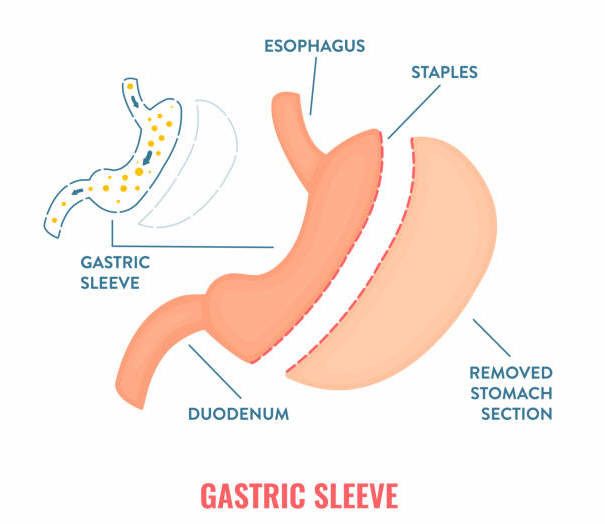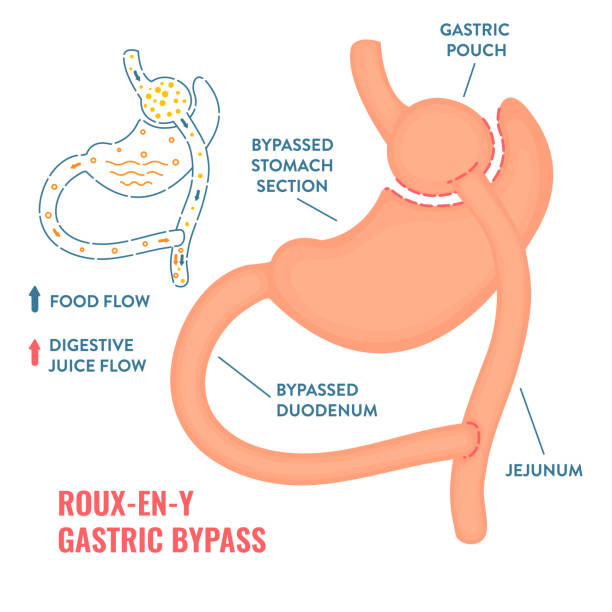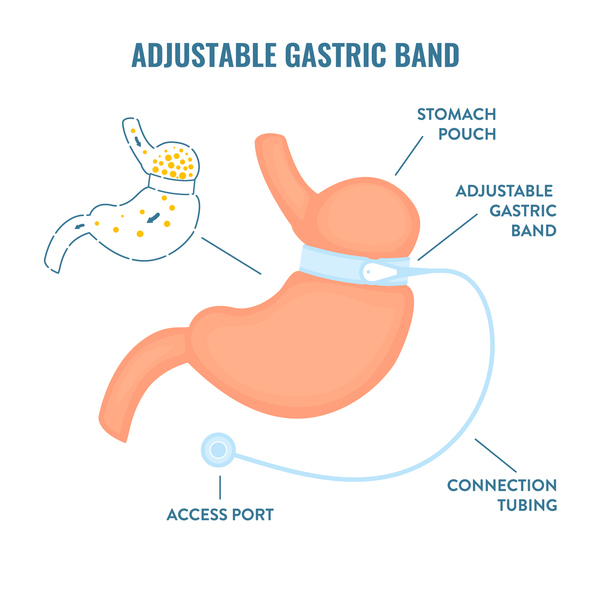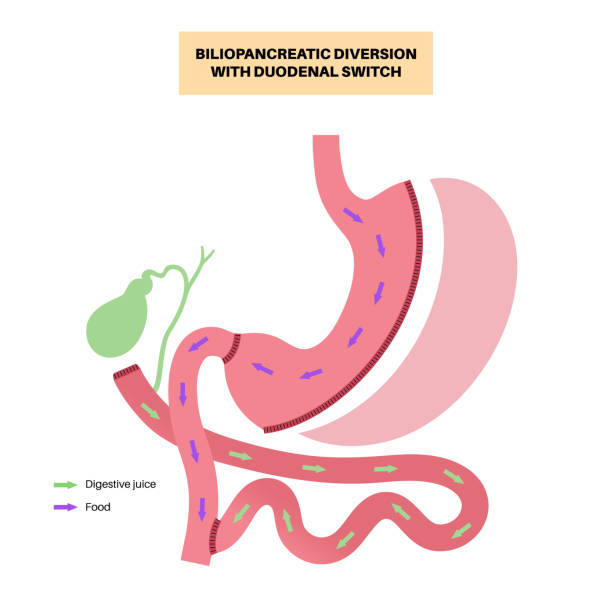Bariatric Weight-Loss Surgery
Weight Loss Journey
Those suffering from morbid obesity and chronic conditions such as hypertension, joint pain and type II diabetes can often face life-threatening side effects, such as stroke, heart attack and permanent disability. While making the choice for surgical weight loss is a serious one, taking this step can dramatically improve your health. At Foothill Regional Medical Center Bariatric Program our specialized team is skilled in the surgical techniques that will achieve the best possible outcome for each of our patients.
 Nationally Accredited Designation
Nationally Accredited Designation
Foothill Regional Medical Center is proud to be a 2025 Bariatric Center of Excellance and is nationally accredited as a Comprehensive Center for Bariatric Surgery by the American College of Surgeons and the American Society for Metabolic and Bariatric Surgery's Accreditation and Quality Improvement Program (MBSAQIP®), a joint program of the American College of Surgeons and the American Society for Metabolic and Bariatric Surgery, and recipient of the Blue Cross/Blue Shield Blue Distinction Center for Bariatric Surgery.
The MBSAQIP promotes uniform standard benchmarks and continuous improvement, validating that our weight-loss program has undergone an independent and rigorous peer evaluation in accordance with nationally recognized bariatric standards. For surgical patients it ensures that they receive the benefits of a multidisciplinary program, with improved patient outcomes and long-term success.
Foothill Regional is reciepient of Healthgrades 2025 Patient Safety Excellence Award (Top 5 percent in the nation) and Healthgrades Five-Star Recipient for Critical Care (Treatment of Sepsis).
Foothill Regional has recieved the Silver Designation, CDPH HAI Antimicrobial Stewardship Program (ASP) Honor Roll 2022-2025
Cutting Edge Robotic Bariatric Surgery
Foothill Regional Medical Center offers procedures utilizing the latest da Vinci robotic system. This minimally invasive precision technology is considered a safer surgical alternative with less pain, shorter length of stay, and faster recovery.
Robotic-assisted surgery can be used to perform vertical sleeve gastrectomy (VSG), gastric bypass, conversion surgery, bariatric revision surgery, and much more. Hear what some of our doctors have to say about robotic-assisted weight-loss surgery.

Studies have found that bariatric surgery tends to reduce the incidence of diabetes. According to the American Society of Metabolic and Bariatric Surgery, nearly all individuals who have bariatric surgery show improvement in their diabetic state. Bariatric surgeries performed in more than 135,000 patients were found to affect type 2 diabetes in nearly 90% of patients by lowering blood sugar, reducing the dosage and type of medication required, improving diabetes-related health problems, among other benefits, according to the ASMBS.
Typically, to be a candidate for a bariatric procedure, you must have a BMI of 35 with two co-morbidities, or 40 and above (about 100 pounds overweight) to quality. You may quality even if you don’t meet these requirements. There is not one bariatric procedure that works for everyone. A consultation with your doctor will help evaluate if you are a candidate for surgery, and which procedure is right for you.
Calculate Your Body Mass Index
Procedures
Gastric Sleeve: In a sleeve gastrectomy, also known as a vertical sleeve gastrectomy or gastric sleeve procedure, the outer margin of the stomach is removed to restrict food intake. During the gastric sleeve procedure, the surgeon removes a large portion of your stomach. The new, smaller stomach is about the size of a banana, which means the patient is less hungry, feels full sooner after eating. Plus, the surgery removes the part of your stomach that makes a hormone that boosts your appetite.
From 2010 to the 2022 gastric sleeves became the fastest growing bariatric surgery procedure. Gastric sleeve surgery is best for people who have a BMI (body mass index) of at least 40. That means you’re 100 pounds or more over your ideal weight.

Gastric Bypass (Roux-en-Y): Considered the Gold Standard for weight-loss surgery, laparoscopic gastric bypass (or Roux-en-Y) is a well-studied effective treatment for morbid obesity. The stomach is made smaller (similar to gastric sleeve), but part of the small intestine is closed off so that food bypasses it. A new stomach pouch is created by making a small or large incision in the abdomen. According to the National Institute of health participants lost an average of 28.4 percent of their body weight after gastric bypass surgery.

Gastric Band (Lap-Band): Gastric band surgery is a surgically implanted device to help people with obestiy lose weight by restricting how much you can eat at one time. The adjustable gastric band reduces the size of your stomach without permanantly dividing it as other surgeries do. According to the National Institute of health participants lost an average of 14.9 percent of their body weight after gastric band surgery.

Biliopancreatic Diversion with Duodenal Switch (BPD/DS): The Biliopancreatic diversion with duedenal switch procedure may be recomended if you are extremely obese and have tried without sucess to get your weight under control. It can help you lose more weight than either the gastric bypass or the sleeve gastrectomy. BPD/DS is not as commonly used as other bariatric surgeries. This type of bariatric surgery changes the size of your stomach and the length of your small intestines to limit how much food you can eat, digest and absorb.

Revision Surgery: Our surgeons also perform revision surgery. Speak with your doctor if you are interested in this option.
Conversion Surgery: Conversion Surgery is a second surgery that converts your original gastric bypass procedure into another new form of bariatric surgery.
Education and Support
We believe pre- and post-education is important to help you reach your weight-loss goals. Our dedicated program director will assist you throughout your journey. In addition, a dedicated registered dietitian offers pre- and post-operative nutrition education classes.
To support your weight-loss, we also offer online and in-person support group options for your convenience. These virtual support groups last about an hour.
Medical Staff
Our surgical teams are highly qualified specialists experienced in the latest surgical methods approved for treatment. In addition to extensive training, they receive continuing education in bariatric surgery.
The bariatric surgeons affiliated with our program are board-certified and fellowship-trained surgeons who specialize in minimally invasive bariatric procedures. Our surgeons include:
Dr. Mir Ali
Dr. Michael Feiz
Dr. Bobby Shahil Gambhir
Dr. Atif Iqbal (MBS Director)
Dr. Milton Owens
Dr. Sean Rim
Dr. Kais Rona
Dr. Michael Russo
Dr. Brian Quebbemann
Dr. Shahram Salimitari
Dr. Hooman Shabatian
Dr. Danny Shouhed
Dr. Kashif Zuberi
Contact Us
If you have any questions about our weight-loss surgery program, or to make an appointment, please call us (714) 619-7744 or email us. We are conveniently located in Tustin on Newport Avenue between the 5 and 55 freeways. Our address is 14662 Newport Avenue.

